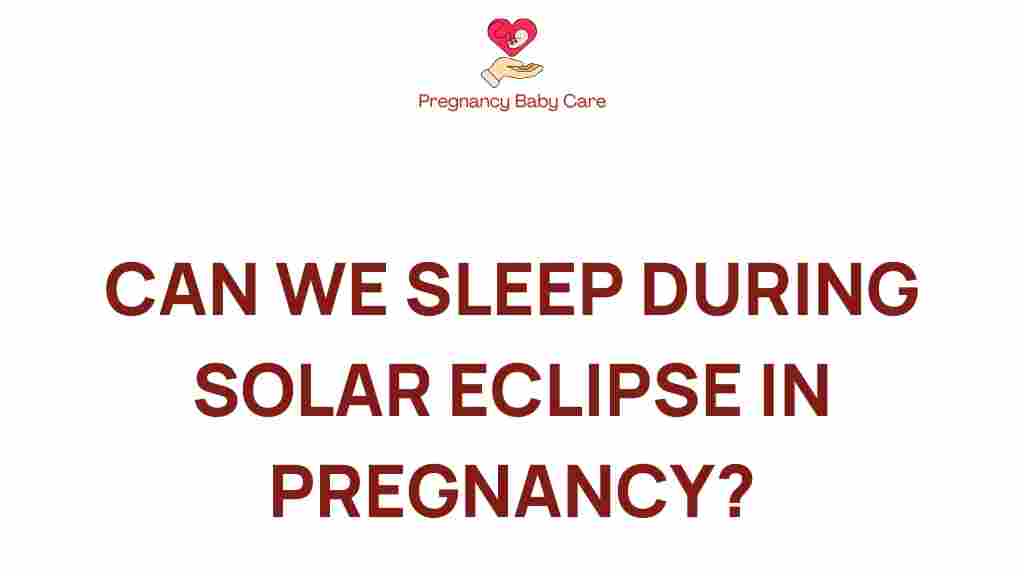Can Pregnant Women Sleep During a Solar Eclipse? Unveiling the Myths
A solar eclipse is a fascinating astronomical event that captures the attention of many, including expectant mothers. As pregnancy brings about numerous changes in the body, questions arise regarding the safety and health implications of experiencing a solar eclipse. One common inquiry is whether pregnant women can safely sleep during such an event. In this article, we will explore the myths surrounding solar eclipses, pregnancy, and sleep, while providing insight into health and safety considerations for expectant mothers during these astronomical phenomena.
Understanding Solar Eclipses
To comprehend the relationship between pregnancy and solar eclipses, it’s essential first to understand what a solar eclipse is. A solar eclipse occurs when the moon passes between the Earth and the sun, blocking the sun’s light either partially or entirely. This event can be a spectacular sight, often drawing crowds and creating a buzz in communities.
- Total Solar Eclipse: The moon completely covers the sun, and the day turns into night for a short period.
- Partial Solar Eclipse: Only a part of the sun is obscured by the moon.
- Annular Solar Eclipse: The moon covers the sun’s center, leaving a ring-like appearance.
Solar eclipses are rare events, making them highly anticipated. However, they also bring forth various myths and misconceptions, especially concerning health and safety for specific groups, such as pregnant women.
Myths About Solar Eclipses and Pregnancy
Throughout history, many myths have surrounded solar eclipses. Some of these myths specifically relate to pregnancy and the well-being of expectant mothers. Here are some common misconceptions:
- Myth 1: Pregnant women should avoid looking at a solar eclipse to protect their unborn child.
Reality: The primary concern during a solar eclipse is protecting your eyes from harmful rays. Pregnant women are not at a greater risk than others when it comes to viewing an eclipse, provided proper eye protection is used. - Myth 2: Sleeping during a solar eclipse can harm the baby.
Reality: There is no scientific basis for this claim. Sleep is essential during pregnancy, and if a woman feels tired during an eclipse, she should rest without worry. - Myth 3: Eclipses can cause physical abnormalities in unborn children.
Reality: There is no evidence to support that solar eclipses have any direct impact on fetal development.
Health and Safety Considerations for Pregnant Women
While the myths surrounding solar eclipses and pregnancy can be alarming, it is crucial to approach the topic with facts. Here are some health and safety considerations for pregnant women during a solar eclipse:
- Eye Protection: If you plan to view the eclipse, ensure you use proper solar viewing glasses or eclipse viewers. Regular sunglasses are not safe for viewing the sun directly.
- Stay Informed: Keep up with local news and updates about the eclipse timing and safety recommendations.
- Comfort and Rest: If you feel fatigued during the eclipse, it’s perfectly fine to take a break and rest. Pregnancy often requires additional sleep.
Expectations During a Solar Eclipse
The excitement surrounding a solar eclipse can lead to high expectations. For pregnant women, this might include planning a gathering with family or friends to witness the event together. Here are some tips on managing expectations:
- Plan Ahead: Decide in advance whether you want to view the eclipse or rest. If you choose to rest, communicate this with your loved ones.
- Choose a Comfortable Environment: If you plan to watch the eclipse, find a comfortable spot with ample seating and shade.
- Hydration and Nutrition: Make sure to stay hydrated and have light snacks available to maintain energy levels.
Step-by-Step Process for Watching a Solar Eclipse Safely
For those who wish to observe a solar eclipse, here’s a step-by-step guide to ensure a safe and enjoyable experience:
- Check the Eclipse Schedule: Look up the date and time of the solar eclipse in your location.
- Purchase Safe Viewing Equipment: Obtain certified eclipse glasses or solar viewers.
- Find a Suitable Viewing Location: Choose a spot that offers a clear view of the sky, away from tall buildings and trees.
- Prepare for Comfort: Bring a comfortable chair or blanket to sit on if you plan to stay for an extended period.
- Stay Hydrated: Keep water and snacks handy to maintain your energy levels.
- Observe Eye Safety: Only look at the sun during the eclipse using proper protection. Never look directly at the sun without certified solar viewing glasses.
Troubleshooting Tips
Even with careful planning, unforeseen circumstances may arise. Here are some troubleshooting tips for pregnant women during a solar eclipse:
- Feeling Overwhelmed: If the excitement becomes too much, stepping away from the crowd and finding a quiet spot can help.
- Fatigue: Listen to your body. If you feel tired, it’s okay to retreat to a comfortable area and rest.
- Weather Conditions: If clouds obstruct the view, don’t be discouraged. You can always view live streams of the eclipse online.
Conclusion
In conclusion, the belief that pregnant women should avoid sleeping or engaging in certain activities during a solar eclipse is rooted in myths and misconceptions. It’s essential to recognize the importance of health, safety, and wellness during pregnancy, especially during astronomical events like a solar eclipse. With proper precautions, pregnant women can safely enjoy these celestial occurrences, whether they choose to watch or rest.
As always, if you have specific concerns about your health during pregnancy, consult with your healthcare provider for personalized advice. For more information on astronomical events and their impact on health, visit NASA’s official website.
For more tips on pregnancy wellness, check out our article on maintaining health during pregnancy.
This article is in the category Pregnancy and created by PregnancyBabyCare Team
